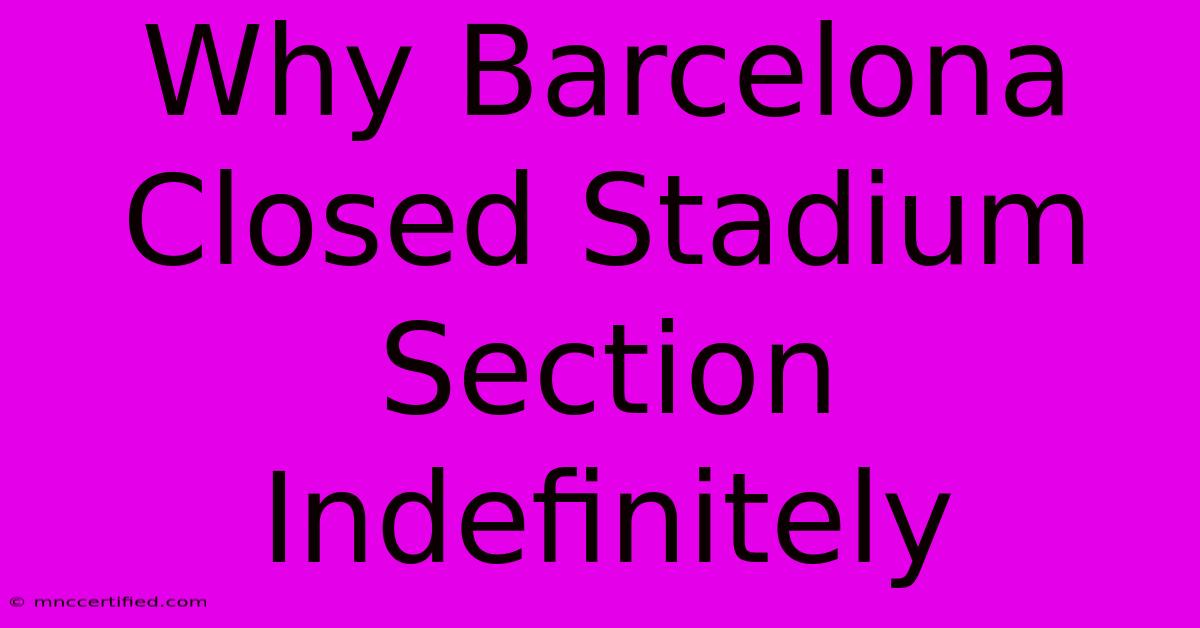Why Barcelona Closed Stadium Section Indefinitely

Table of Contents
Why Barcelona Closed Stadium Section Indefinitely: A Deep Dive into the Incidents at Camp Nou
On October 2023, FC Barcelona took the unprecedented step of indefinitely closing a section of its iconic Camp Nou stadium. This drastic action wasn't taken lightly; it followed a series of unacceptable incidents involving a specific group of fans. This article delves into the reasons behind this closure, exploring the events that led to the decision and its broader implications for the club and its supporters.
The Events Leading to the Closure: A Timeline of Unacceptable Behavior
The closure wasn't a knee-jerk reaction. Instead, it culminated from a pattern of disruptive and offensive behavior from a specific section of fans, primarily located in the Gol Nord (North Goal) stand. These incidents included:
-
Chants and Banners Promoting Violence: Reports surfaced of repeated chants promoting violence against rival teams and players. These were not isolated incidents but rather a recurring problem, escalating in intensity and frequency over several matches. The chants often targeted specific individuals and were deemed beyond the bounds of acceptable fan behavior.
-
Throwing Objects onto the Pitch: Several instances of objects – ranging from bottles and lighters to more dangerous projectiles – being thrown onto the pitch during games were reported. This posed a significant risk to players, officials, and even other spectators. These incidents caused repeated delays and disruptions to the flow of matches.
-
Racist and Xenophobic Abuse: Allegations of racist and xenophobic chants and banners aimed at both opposing players and fans were consistently brought to light. This is utterly unacceptable and violates the club's code of conduct, as well as broader societal norms.
-
Ignoring Previous Warnings: Barcelona’s administration had issued several warnings to the offending fans in the Gol Nord section. These warnings ranged from verbal cautions to written reprimands, but the disruptive behavior continued unabated, forcing the club's hand.
The Club's Response: Indefinite Closure and a Message of Zero Tolerance
Faced with escalating incidents and the failure of previous warnings, Barcelona decided on the indefinite closure of the affected section. This decisive action underlines the club’s commitment to providing a safe and respectful environment for all attendees. The closure serves as a strong statement:
-
A Commitment to Fan Safety: The club prioritized the safety and well-being of players, officials, and the vast majority of respectful fans attending matches. The disruptive behavior of a small minority threatened this safety.
-
Zero Tolerance Policy: The action signals a zero-tolerance policy for violence, racism, xenophobia, and any other form of unacceptable conduct within Camp Nou.
-
Protecting the Club's Image: The negative publicity surrounding the incidents damaged Barcelona's reputation. The closure demonstrates a proactive approach to resolving the issue and restoring its image.
The Wider Implications: Setting a Precedent for Other Clubs
Barcelona's decision sets a significant precedent for other football clubs worldwide. It demonstrates that clubs are willing to take strong, decisive action against disruptive and offensive fan behavior. This proactive approach could encourage other clubs to implement similar measures, contributing to a safer and more respectful atmosphere at football matches globally.
Future Prospects and Potential Solutions
While the indefinite closure is a strong measure, it’s crucial to address the root causes of the problem. Future solutions might include:
-
Improved Fan Education and Engagement: Investing in initiatives to educate fans about acceptable behavior and encourage positive fan culture.
-
Enhanced Security Measures: Strengthening security protocols within the stadium to identify and address disruptive behavior more effectively.
-
Collaboration with Fan Groups: Working with responsible fan groups to foster a more positive and inclusive atmosphere.
The closure of a section of Camp Nou is a serious event with far-reaching implications. It reflects a firm stance against unacceptable behavior within the stadium, sending a clear message that such conduct will not be tolerated. The long-term success of this initiative will depend on a multi-faceted approach addressing both the immediate issue and its underlying causes. Only through a collaborative effort can football stadiums become truly safe and inclusive environments for all.

Thank you for visiting our website wich cover about Why Barcelona Closed Stadium Section Indefinitely. We hope the information provided has been useful to you. Feel free to contact us if you have any questions or need further assistance. See you next time and dont miss to bookmark.
Featured Posts
-
Walmart Curtails Dei Programs
Nov 27, 2024
-
Sporting Cp Vs Arsenal Watch Champions League
Nov 27, 2024
-
Homeserve Water Line Insurance
Nov 27, 2024
-
Vanderpump Rules Returns Season 12 Cast
Nov 27, 2024
-
Champions League Bayern Vs Psg Live Match Stream
Nov 27, 2024